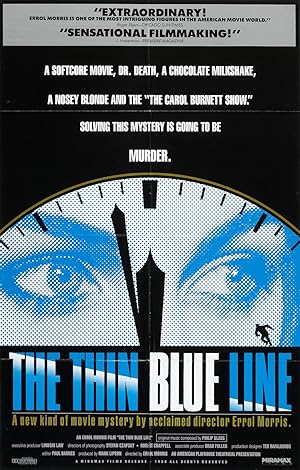Ever since I got interested in film analysis in college, The Thin Blue Line loomed over my existence as one of the greatest documentaries of all time, but it has taken over two decades to watch it. Netflix and crime TV shows owe some coins to Errol Morris for his interview style, recreations and crusade to get possibly innocent people released from jail. Full disclosure: when I finally watched the documentary, there were numerous interruptions and distractions, which are the hallmark of home viewing, but were particularly prominent during this film.
My critique of the film is not a critique of Errol Morris’ assessment that Randall Adams was not guilty of shooting and killing a police officer. With the benefit of hindsight, more time to examine the evidence and David Harris’ later confession, it is clear that Adams was more than not guilty, but innocent. Morris deserves praise for playing an essential role in saving him and seeing what others could not. His unique perspective may end well, but that does not mean that his perspective is not just as problematic as the prosecutor’s, but in a different way.
The Thin Blue Line exploited a lot of implicit bias in service of their cause. During an interview, it was revealed that the two patrol officers went to a local burger joint, but Burger King is prominent in all the recreations. Did Morris place a commercial in his film to get funding or is there another reason why he would place a fictional element in a documentary? During this sequence, the interviewees mention that the deceased officer’s partner was the first female officer and just beginning in her career. Because her partner was killed, the film never suggests that he, the possibly more senior officer, told her to stay in the car and finish her meal while he checked out the car. Instead the movie strongly implies that she is so innately unprofessional and devoted more to her food than her partner’s safety that she was derelict in her duties. Morris exploits viewers’ bias that women can’t be adequate partners and played a role in her partner’s death.
Morris interviews the defense attorneys, who are my favorite interviewees in The Thin Blue Line, who mentioned the harassment that they received while in Vidor, Texas then reference its racist history, but they also mention that everyone thought that the murdered police officer was black. Wait? Wouldn’t the town like Adams then? I’m willing to overlook this unexamined contradiction because racists usually are not known for their consistency, but will jump at any opportunity to hate as many things and people as possible. This contradiction does play an important role in a later sequence.
The Thin Blue Line impugns the testimony of two witnesses, an interracial married couple, by interviewing a woman who knew them, testified for the defense and characterizes them as “scum.” Is she calling them scum because they are criminals as she alleges or is she disgusted by the existence of their relationship? Why would she associate with scum and somehow have intimate knowledge of their motivations if she was so repelled by them? Morris interviews the husband and wife separately then distances the husband from the wife by allowing the husband to recount times when his wife reported him to the cops for drug running, but cops never found drugs without using independent corroboration for either the woman’s allegations or his story.
On one hand, Morris is critiquing the cops with respect to Adams, but on the other, he relies on their alleged clearing of the husband as proof that the wife is a liar. He believes the cops when it serves his cause instead of another, more consistent alternative: Vidor cops were not that competent and professional. Morris is consistent in one way: he does not believe the women witnesses for the prosecution and uses prevailing notions of them as busy bodies, interfering and not belonging in certain spaces as the easiest way to discredit their testimony.
The Thin Blue Line is emblematic of the central problem of well meaning, left leaning filmmakers. Occasionally when you closely examine their work, it is indiscernible from the rhetoric of the right, but is more alarming because the filmmakers may be unaware of how problematic they are and therefore there is no hope for improvement or worst they are aware, but are willing to throw other ideals under the bus for a cause because it is easier therefore they cannot be completely relied on trusted. With friends like these…..
Stay In The Know
Join my mailing list to get updates about recent reviews, upcoming speaking engagements, and film news.





